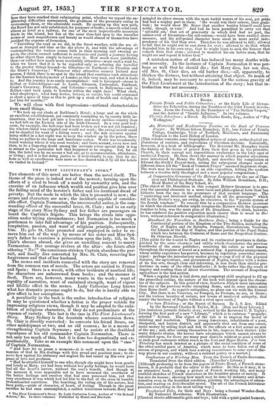THE FIRST LIEUTENANT'S STORY..
THE elements of this novel are better than the novel itself. The theme of the piece is indeed not of the newest; turning upon the efforts of a rival to break off a match by unworthy arts, and the exercise of an influence which wealth and position give him over the failing mind of the heroine's father and his irrational dread of poverty. But the mode in which the idea is presented is new ; the scenes and characters are new; the incidents capable of consider- able effect. Captain Normanton, the unsuccessful suitor, is the com- manding-officer of the successful lover, St. Clair ; and in an early stage of the story Miss Sydney and her father are passengers on board. the Captain's frigate. This brings the rivals into oppo- sition under trying circumstances; but Normanton is too much a gentleman to take full advantage of his position. Subsequently, temptation, passion, and want of religious principle, overpower him. He gets St. Clair promoted and employed in order to re- move him out of the way; by means of his sister and Miss Syd- ney's father he exercises a persecution upon the lady, till, in St. Clair's absence abroad, she gives an unwilling consent to marry Normanton. Her courage revives at the altar : she faints after uttering " No the conscience-stricken Captain abandons the pur- suit, and finally dies converted by Mrs. St. Clair, receiving her forgiveness and that of her husband.
The scenes and incidents connected with the story are removed from the common run of novels. The actors are carried to France and Spain ; there is a wreck, with other incidents of nautical life; the characters are unborrowed from books ; and the manner is fresh. There are, however, many wants in the work ; want of rapidity of narrative, want of sustained strength, want of vigour and lifelike effect in the scenes. Lady Catherine Long knows what her dramatis personae ought to do, but she is hardly able to give effect to her conceptions.
A peculiarity in the book is the undue introduction of religion. It may be questioned whether a fiction is the proper vehicle for impressing religious views, though it may be adapted to the exhi- bition of religious characters, if they do not predominate at the expense of variety. This last is the case in The First Lieutenant's Story. Mary Sydney is the fountain whence conversion flows. St. Clair is directly converted : he converts his friend Bruce, an- other midshipman or two, and an old seaman ; he is a means of strengthening Captain Seymour; and he assists at the deathbed repentance of his old commander Captain Normanton. There is not only too much of this, but it is done too dogmatically and ex- positionally. Take as an example this comment upon the " case" of Captain Normanton.
"And here let us pause a moment—it is well worth it—to trace the mercies of God in His dealings with this proud and penitent man ; to ob- serve how against his obduracy and neglect He had raised up His own pur- poses of love and goodness.
"-Had he attached himself to one who, though she might have been gentle and lovely as Mary, yet had been without her godly feelings, he would have had all the heart's sorrow, without the soul's benefit. And though at the moment it were impossible not to have mourned the overthrow of the better feelings and resolves that had once possessed him, yet that very overthrow it was which had led him to the foot of the cross in humble brokenhearted contrition. The besetting, the ruling sin of his nature, had been pride,—pride of character, of heart, of feeling. Though in the great sacrifice he had once contemplated, a sudden tenderness towards Mary had • The First Lieutenant's Story. By Lady Catherine Long, Author of "Sir Roland Ashton," 8:o. In three volumes. Published by Hurst and Blackett. mingled its silver stream with the more turbid waters of his soul, yet pride, had had a mighty part in them. ' He would win their esteem, their grati- tude ; he would show Mr. Bruce that another besides himself could love nobly, though in vain !' And had he been permitted to carry out that ' splendid sin,' that act of generosity in which God had no part, the canker-evil of his nature—his self-esteem—would have been exalted above measure, and his self-poised character have stood in more awful inde- pendence of his God than ever. Therefore he was allowed to fall; allowed to fall that he might not be cast down for ever ; allowed to do that which degraded him in his own eyes, that he might learn to seek the honour that cometh from God alone ; allowed to manifest his sin before man, that he might see and repent it before God."
A mistaken notion of effect has induced too many deaths with- out necessity. In the instance of Captain Normanton it was per- haps as well that ho should die ; but Mary dies, her son dies, old Mrs. St. Clair dies, an old barber dies,—all, apparently, to thicken the distress, but without attaining that object. So much of it, indeed, may be necessary to account for the serious gravity of the First Lieutenant at the introduction of the story ; but that in- troduction was not necessary.
























 Previous page
Previous page